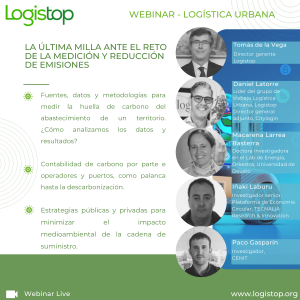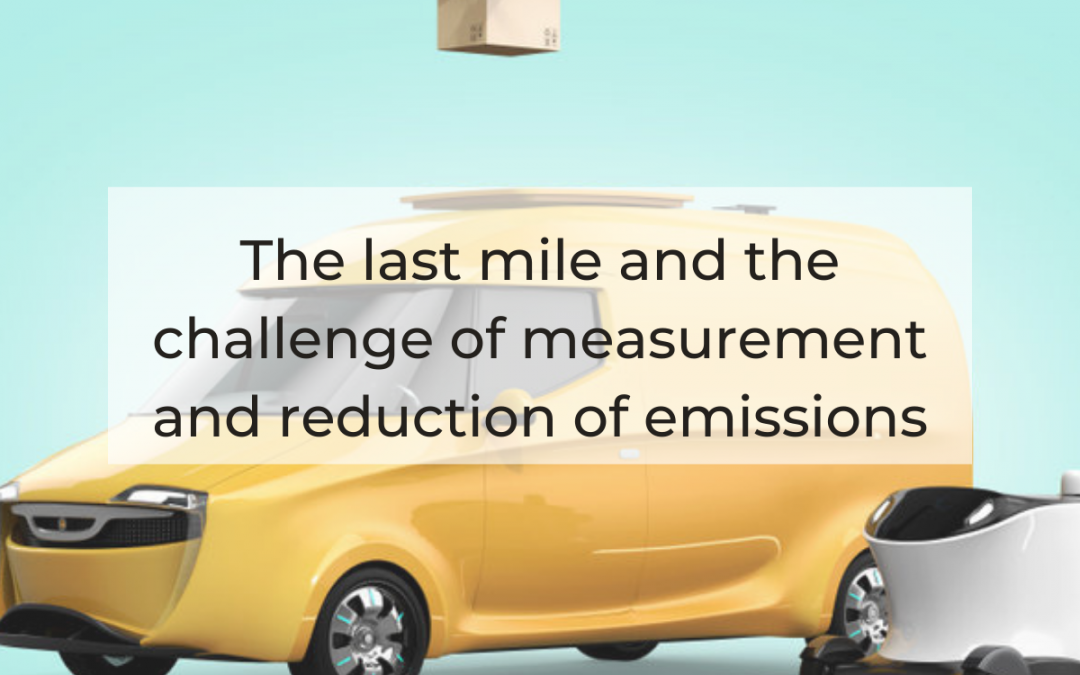- Involvement of all key actors involved in urban freight distribution is key to work on emissions reduction.
- Measuring emissions calculated from the consumption versus the production side.
- How can the carbon footprint be offset?
In the Logistop Webinar “The last mile and the challenge of measurement and reduction of emissions” we present to the audience part of the state of the art and show concrete examples of existing methodologies that allow us to measure the carbon footprint of logistic and multimodal chains.
For this, we have counted with the participation of Daniel Latorre, leader of the Urban Logistics working group, Logistop, and Deputy Managing Director, Citylogin, Macarena Larrea Basterra, PhD Researcher at the Energy Lab, Orkestra, Universidad de Deusto, Iñaki Laburu, Senior Researcher, Circular Economy Platform, TECNALIA Research & Innovation, Paco Gasparín, Researcher, CENIT, as well as the presentation and moderation of Tomás de la Vega, Managing Director, Logistop.

In his introduction, Daniel Latorre highlighted the importance and the need to measure (since what is not measured is not controlled) in order to be able to make decisions based on standardised and comparable data. Furthermore, in this process of measurement and standardisation, Daniel considers it necessary to involve not only transport companies, but also all the key agents that act in this environment, such as the administration, as a regulatory body, and to work with technology providers that favour collaboration, it being essential to work in alignment with shippers and operators willing to share information.
“One of the main problems we face is the lack of knowledge of the reality and/or the existence of contradictory information regarding emissions pertaining to transport”
Daniel Latorre, leader of the Urban Logistics working group, Logistop, and Deputy Managing Director, Citylogin
The impact of the circular economy on greenhouse gas emissions
Macarena Larrea then explained the different phases of the methodology developed for the Basque Environment Agency, the aim of which is to give a picture of the situation of the economy in terms of emissions in order to be able to discern the measures to be adopted and assess the measures to be applied.
Macarena analysed how for the analysis carried out, instead of carrying out the traditional measurement from the production point of view, they implemented a measurement calculated from the consumer’s point of view (using the terms from the production point of view as a basis for calculation) with the aim of having a picture of the economy in terms of emissions. Among other aspects, this methodology has allowed them to analyse what happens if it is decided to implement a circular economy measure in the process and the impact it will have in terms of emissions.
Macarena also stressed the importance of continuing to refine this tool and assign different emission factors depending on the origin of the goods (which is difficult to achieve).
“It is important to make progress in improving rail and maritime transport infrastructure and optimising land transport because this will allow us, to a large extent, to considerably reduce the emissions associated with transport”
Macarena Larrea Basterra, PhD Researcher in the Energy Lab, Orkestra, University of Deusto
Carbon Footprint and Environmental Footprint
For his part, Iñaki Laburu analysed the difference between carbon footprint and environmental footprint, the carbon footprint being a single impact that is part of the environmental footprint, which is multi-impact. When calculating environmental impacts, these are calculated by defining the stages of the life cycle in which the inputs (natural resources, energy, etc.) and outputs (atmospheric emissions, wastewater, solid waste, etc.) that will be translated into environmental impacts must be determined. This calculation is structured in four stages: 1) definition of objectives and scope; 2) development of the Life Cycle Inventory (LCI); 3) Life Cycle Impact Assessment (LCIA) and 4) interpretation.
To conclude his speech, Iñaki explained to the participants what carbon footprint offsetting consists of through the purchase of VERs, which are emission rights from the voluntary market from projects with emission reductions and whose price can vary greatly depending on the purchase motivations and sales needs, as there is no daily price regulation market.
“El análisis de ciclo de vida es la metodología principal en la que se basan los cálculos tanto de la huella de carbono como de la huella ambiental”
Iñaki Laburu, investigador senior, Plataforma de Economía Circular, TECNALIA Research & Innovation
Last mile strategies for emissions reduction
Finally, Paco Gasparín gave an overview of the impact of urban logistics on emissions generation, highlighting that last mile distribution strategies can contribute to ameliorate the negative impacts of urban logistics, although they can be influenced by different factors and may even be in conflict and require careful prioritisation depending on the city.
To explain these different strategies that can be developed, Paco shared a series of use cases, such as SMILE UE-Project (Barcelona, 2014), GrowSmarter (Barcelona, 2019), S.M.U.D. (EIT Urban Mobility, 2020) and HALLO (EIT Urban Mobility, 2021 – 2022) that illustrated the practical application of the different strategies used.
“Defining a homogeneous methodology, establishing reference values for emissions and carrying out monitoring to quantify the impact are the main challenges facing urban logistics on its way to reducing emissions”
Paco Gasparín, Researcher, CENIT
About Logistop
Logistop is the benchmark workspace for collective innovation through the realisation of projects hand in hand with our members. Transforming the entire supply chain into a more efficient and sustainable one. All this with the aim of articulating and carrying out innovation projects among the members, without excluding the possibility of collaborating with or receiving support from certain organisations outside Logistop.

